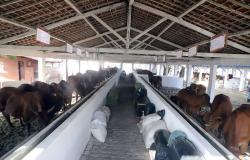In 2023, eight out of every ten adults (78.6%) living in Brazilian capitals maintained a diet without the recommended minimum amount of fruits and vegetables, a rate that could improve with the promotion of production in urban areas. This is one of the warnings made by experts from Instituto Escolhas and the Josué de Castro Chair in Healthy and Sustainable Food Systems, at the Faculty of Public Health of the University of São Paulo. 
In a publication this Thursday (26), researchers recall that the daily portion recommended by the World Health Organization (WHO) is 400 grams of this class of foods, essential for maintaining good health. According to the study, less than a fifth (19%) of the food products purchased by households (person/year/kg) were fruits and vegetables in 2018. Data from Vigitel Brasil 2023 – Surveillance of Risk and Protective Factors were used for Chronic Diseases by Telephone Survey, from the Ministry of Health, to assess the current context.
Healthier foods have been replaced by ultra-processed foods, which contain chemical additives and pose a health risk if consumed frequently. The intake of this type of product worries bodies such as the National Health Council (CNS), which released a report highlighting that it is in favor of increasing the tax burden on the category, as a way of discouraging purchases by consumers.
In the note, the CNS highlights that, “from 2006 to 2022, food prices rose 1.7 times more than general inflation (IPCA) and that healthy foods increased almost three times more, compared to ultra-processed foods.” The researchers behind the study note that poor diet is a factor related to overweight, obesity and the development of chronic non-communicable diseases, such as cancer, diabetes and cardiovascular and respiratory diseases.
One of the solutions identified by the research authors is to stimulate the local healthy food production network. “When food is produced close to consumers, there is a potential reduction in transportation and marketing costs, which is reflected in the final price. Short marketing circuits encourage the direct sale of food produced by local farmers to consumers in cities, without the need for many intermediaries or displacements”, they state.
Estimates from Instituto Escolhas, mentioned in the study, indicate that the metropolitan region of São Paulo, for example, would have the potential to supply 20 million people with vegetables every year, if initiatives of this nature were encouraged. In the case of Belém, Curitiba, Rio de Janeiro and Recife, the contingent would reach 1.7 million, 551,910, 372,376 and 252,424 people per year, respectively.






